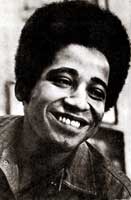A tribute to George Jackson
Published Aug 28, 2008 10:57 PM
This past Aug. 21 marked the 37th anniversary of the assassination of
Black Panther leader and political prisoner, George Jackson, in San Quentin
Prison by prison guards. His death was an important spark for the heroic Attica
Prison uprising in upstate New York just one month later, which helped to
expose inhumane conditions in U.S. prisons, which still exist today. The
following article, “George Jackson: A note on his life,” first
appeared in the Aug. 31, 1971, issue of Workers World.
George Jackson was born September 23, 1941, in the heart of Chicago’s
ghetto. Having moved to Los Angeles, he was 15 when shot six times by L.A.
police and sent to a juvenile prison for seven months for allegedly attempting
to remove goods from a department store. From then on, his life became a series
of run-ins with racist U.S. “justice.”
In 1960, George was accused of robbing $70 from a gas station. Convinced by the
district attorney to cop a plea for a light sentence, he pleaded guilty and was
instead given a one year to life imprisonment. He was 18 then. Eleven years
later George Jackson was still in jail, most of the time locked up in maximum
security.
During that time his readings extended from Shakespeare to Mao, writing
constantly, training himself legally and physically, teaching his fellow
inmates to read and write, bringing the political message of Black liberation
to his people. His respect and influence among the other inmates grew to such
an extent that prison officials felt that their rule through terror was being
threatened and finally he, along with John Clutchette and Fleeta Drumgo, was
accused of killing a guard in retaliation for the murder of three Black
prisoners who were gunned down in the prison yard by a guard firing from a
tower.
All pleaded their innocence, George Jackson becoming the outstanding spokesman
of the Soledad Brothers, as they came to be called. George was looking forward
to the trial. He planned to use his public appearances in court to expose the
vicious brutality of the U.S. prison system as well as the overall racist
oppression of the Black community in the U.S. To prevent him from doing just
that, on August 21 George Jackson was murdered by prison guards. Even if it
were true, as the authorities charge, that Jackson was attempting escape, he
was justified in seeking freedom from his racist captors by any means
necessary. The prison system deprives the oppressed of every political and
human right. What right is left but to rebel?
But his fellow prisoner Ruchell Magee has charged that the racist guards shot
George Jackson in cold blood in his own cell. Thus his murder, in addition to
being a tragic loss to all revolutionaries, is one of the most heinous crimes
and frame-ups in the blood-soaked history of this repressive system.
Articles copyright 1995-2012 Workers World.
Verbatim copying and distribution of this entire article is permitted in any medium without royalty provided this notice is preserved.
Workers World, 55 W. 17 St., NY, NY 10011
Email:
[email protected]
Subscribe
[email protected]
Support independent news
DONATE


